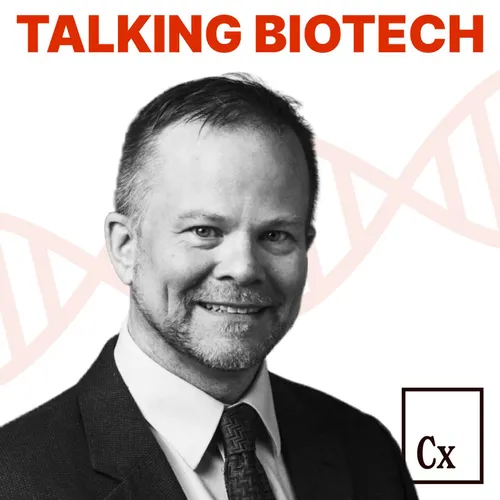
Talking Biotech with Dr. Kevin Folta
Talking Biotech is a weekly podcast that uncovers the stories, ideas and research of people at the frontier of biology and engineering.
Each episode explores how science and technology will transform agriculture, protect the environment, and feed 10 billion people by 2050.
Interviews are led by Dr. Kevin Folta, a professor of molecular biology and genomics.
- Update frequency
- every 6 days
- Average duration
- 42 minutes
- Episodes
- 468
- Years Active
- 2015 - 2025

Standardizing Therapeutic Protein Production in Plants - Jim Wilson
Where many therapeutic compounds are raised in bacteria or fungi, plants sometimes offer many advantages as bioreactors. Capital and production costs are lower, and products may be edible instead of …

Canadian Rules for Gene Editing - Jennifer Hubert
Canada has a unique approach to plant genetic improvement that follows the product, not the process. In other words, if there is potential risk from any genetic manipulation technique, from polyploid…

Overcoming CAR-T Cell Bottlenecks - Dr. Andy Scharenberg
Immunotherapy is weaponizing the body's immune system against cancer or other disease. One of the most promising approaches is CAR-T cell therapy, yet as this technology has been implemented, it's li…

The FDA Regulatory Ecosystem- Expert Panel Discusses the Process
How do new drug applications move forward to approval? Four experts discuss the partnership between the FDA, the drug developer, and the data needed to move a product forward. It is a surprising dis…

The Psychology of Risk - Dr. Felicia Wu
We live in amazing times of technological advance, but how are the real benefits of new tech lost to an inflated sense of risk? Dr. Felicia Wu from Michigan State University shares her expertise in …

Restoring the Forest with GE American Chestnut - Dr. Andy Newhouse and Erik Carlson
This is an update on the American Chestnut Restoration Project, as discussed previously on the podcast. The American Chestnut dominated the forests of Appalachia until an imported fungus destroyed th…

Addressing Disparities in Women's Healthcare - Sabrina Johnson, CEO Daré Bioscience
Despite being over half of the population women's health care lags behind other areas of drug development. The problem is caused by many facets, but is augmented by the fact that many of the conditio…

Return of Talking Biotech; Stories in the News
After a three month hiatus the Talking Biotech Podcast is back. Today's episode is a visit with Colarbra CEO Aoi Senju about his view for the podcast, followed by synopsis of three major news stories…

Temporary Hiatus, Changes Coming!
After 8.5 years of weekly podcasts I'm going to take a 5 week break and plan new episodes for 2024. I'm going through a medical glitch that has me unable to do my normal work. On top of this we're g…

A Novel RNAi Approach to Crop Protection - Todd Hauser
Even under the best conditions, crops need our assistance to survive the numerous threats that limit production. Classically, synthetic and natural compounds have been used to control insects, fungi …

Drugs from the Rainforest - Lisa Conte
There is tremendous variation in the plant kingdom, as plants have adapted to many ecological niches with discrete challenges. Part of adaptation is production of novel secondary metabolites, compoun…

Proposed Gene Editing Changes in the EU -Dr. Emma Kovak
Gene editing is a powerful and specific technique that allows customized changes to DNA. Because there are no additional sequences transferred, and alternations match what could happen naturally over…

"On Disinformation" Critical Conversations in the Post-Truth Era- Dr. Lee McIntyre
Information has been weaponized, and the ability to create false information to achieve an ideological goal has never been more easy. Political polarization, science denial, and a shining, effective …

Therapeutics Controlling Protein Turnover - Dr. Juliet Williams
While DNA captures most of the fanfare, proteins are the catalytic and structural superstars of the cell. However, they can also become problematic. Cells have intricate mechanisms to remove damaged …

Biohacking, DIY Biotech- Opportunities and Ethics with David Ishee
Recombinant DNA technologies once confined to the laboratory are now available to just about anyone. Is this a good thing or an extreme risk? David Ishee is self-described biohacker, dog breeder and …

Rapid Detection of Dangerous Pathogens - Dr. Brad Perkins
We're surrounded by microbes, many that are the basis of disease. Others have evolved resistance to our best antibiotics. Others may be weaponized for bioterrorism. Because microbial threats can evol…

The Pawpaw: History and Genetic Improvement - Adam D'Angelo
The Pawpaw (Asimina triloba) is the largest native North American fruit, and grows wild throughout most temperate forests of the eastern United States and Canada, from southern Ontario to the Florida…

In The News: Citrus Greening Disease Update; Dangerous Seed Oils? Cameron English
In today's episode I cover two topics with Cameron English, science journalist and podcast host. We discuss the current status of citrus greening disease in the USA, a disease that has ravaged the F…

Dogmatism Meets Unpopular Evidence: the Case of Second-Hand Smoke - Dr. Geoffrey Kabat
The connection between tobacco smoke, cancer and heart disease has been well established since the 1800's, with irrefutable medical evidence presented since the 1950s. There is no question that smoki…

A Non-Profit Biotech Model; Therapies for Rare Diseases - Dr. Ashley Winslow
This episode has two parts. The first part discusses how Odylia Therapeutics is addressing rare disease, using a novel non-profit model. The second half address two rare genetic eye diseases and the …